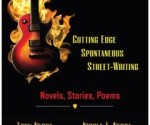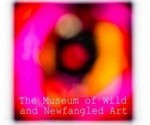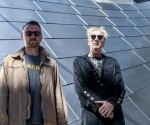Guitar God Adrian Belew discusses his new project Flux and more
 Musician Adrian Belew might be best known as one of the world’s great guitar players but fans also know he’s a great singer, songwriter, multi-instrumentalist and record producer. He was discovered by Frank Zappa in the late 1970’s and has worked with the likes of David Bowie, the Talking Heads, The Bears, and most notably King Crimson. He has also produced several successful solo albums and contributed to an array of albums ranging from Paul Simon’s Graceland to Cyndi Lauper’s True Colors to Nine Inch Nail’s The Downward Spiral. The Adrian Belew Power Trio is currently on tour and I was able to catch up with him before his show at the Highline Ballroom.
Musician Adrian Belew might be best known as one of the world’s great guitar players but fans also know he’s a great singer, songwriter, multi-instrumentalist and record producer. He was discovered by Frank Zappa in the late 1970’s and has worked with the likes of David Bowie, the Talking Heads, The Bears, and most notably King Crimson. He has also produced several successful solo albums and contributed to an array of albums ranging from Paul Simon’s Graceland to Cyndi Lauper’s True Colors to Nine Inch Nail’s The Downward Spiral. The Adrian Belew Power Trio is currently on tour and I was able to catch up with him before his show at the Highline Ballroom.
It seems like music is a language that you just seem to have taken to early on, I know you taught yourself guitar right?
I taught myself everything that I play. I play a lot of instruments and I taught myself to produce records and so much technology has come down the pike in the years I’ve been making music, so yes, I’m totally self taught. I never tried to learn to read music even when I played with Frank Zappa whose music is super complicated. I learned it by rote. That’s the way I work.
I think that there’s an intrinsic value to music, even if you’re not a great player. What was your experience with music like before you really played?
Oh, I’ve always had a love for music, even when I was a child with my aunts and uncles by singing along with the jukebox trying to emulate all the singers of that era and I kinda knew. From age 5 on I could just understand things musically, I could understand harmonies and odd things that I don’t think many 5 year olds can understand. At age 10 I got into the school band. I wanted to march around in parades and play drums and things and at 13-14 the Beatles came out and I played drums in my first band and realized that’s what I’m going to do with my life.
I have to ask you about some of the bands you played with because they are some of my favorite bands ever. Frank Zappa discovered you and you spent a number of years with David Bowie, then you played with the Talking Heads and Nine Inch Nails. These different types of musicians have a consistent creativity about them, but who was your favorite collaborator?
That’s a tough one, I don’t know if I can say a favorite. I’ll just say that they’re all different. Every time I’ve certainly been involved with a collaboration, I come to it with an open mind. The only thing that they all seem to have in common mostly is they’re all innovative in their own unique way. Trent Reznor making a record is totally different than say Paul Simon, or you know someone else. I love the collaborations because they keep me kind of sharp. Like I say, you go in, and you might only be there for 4 days making a record with someone, you have to get right down to knowing them and knowing what their needs are and what they’re hoping to get from you and you have to give it to them. It’s different than having a band, like being in King Crimson, that took me 33 years to be able to express all the things I wanted to or the solo career with 20 albums. When you’re playing, you’re just in the studio with someone for a few days, it’s just a different dynamic. First of all, I love it because you make all these new friends and connections, they’re always some of the most amazing people. Just to be around David Bowie. I played with David Bowie all around the world so he’s an exception because I did tour with him. I didn’t tour with most of the people I made records with but just to be around someone like that, it’s mind blowing. My year with Frank Zappa changed my life so much I can’t even explain it and I feel really really fortunate that I have in my mind my own little home movie of all the faces he made and all the stories he told and I was there.
Well, I’m envious! You’re so known as an innovative guitar player and one of the best, I wanted to ask you what you think makes a great guitar player?
I think the guitar is one of the most expressive instruments with a few others. You can bend notes, you can affect the guitar in so many ways electronically, there’s so many different guitar approaches, acoustic guitar, bluegrass guitar, jazz guitar, it’s really such a great expressive instrument. I feel like that best guitarists are the ones who figured out how to express themselves best. And so I would say overall my favorite guitar players are all the ones who found their own way, their own voice. And that’s not easy to do and that’s rare. Most of the time, most guitar players are doing things they learned somewhere else and they are just kind of reshaping them a little bit or combining them with something else and that’s the way I started because that is the way you start. You learn it but at some point you have to break away from it and when you do that and you find your own way of doing something, those are the people that I think rise to the top because they’re the ones that sort of make something new for other people to learn.
Over the years you’ve been working with creative people and then working as a solo artist creatively and I’m impressed with Flux, your new project, and the whole concept. How did you come around with that idea?
Well, it’s really a strange story. In 1979, I first toured Europe with David Bowie and we had a day off in in Marseilles, France. It’s a harbor town and so I went down to the harbor and was sitting there outside enjoying a Coke or whatever and there were 2 cafes behind me, each of them had their door open, each of them playing a different radio station. The music was kind of intermingling in the air with the harbor, people walking by, laughter, seagulls, boat horns, wave sounds and I just realized that’s how I wanted my music to be. Over those decades since, I’ve been trying to figure out how to do that and eventually came to the realization it would have to be done in a matter that didn’t repeat itself. 5 years ago I decided I’m going to try to make this work even though I don’t know how technically to do it. I thought it would make a music form that would change quickly, randomly, in short bursts, just like the internet does. Just like people process information. Originally, Flux was a music concept only. I thought it would be some “way on” record that it would be different every time you heard the record but as it turns out its an app. There has to be some visuals so it makes it even more intriguing. Now, even when you’re listening to music, which always comes at you in different ways and so do the visuals and they never lie, they never come up the same way either. So for people who really still want something more common process, you can favorite anything you ever hear and it automatically gets put into a playlist and you can go back and hear that anytime you want, so over time you can build up a playlist of your favorite bits. It’s like a big jigsaw puzzle.
I love the merging of art, technology, music in that way and you are really giving people an experience that’s really unique and it’s really innovative.
Well that’s what we try to say, it is a Flux experience. It’s a different half an hour every time you press play. And by the way, no one will ever hear that half an hour the same either, so it makes it quite unique. One other thing about it that I really love is it’s never done because I can continue to add and update and change things if I want. It gives me like a lifelong painting that never stops.
For more information on Adrian Belew and his new project Flux, please visit www.adrianbelew.net.










